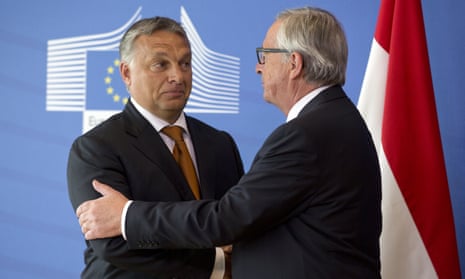The European elections last month were widely seen as a test of the EU’s resilience. Many were relieved that far-right parties did not do as well as feared. However, nationalism is still on the rise across the continent, and the EU is not an innocent bystander.
A meeting of two Islamophobes earlier this month brought this home to me. That day, Myanmar’s Aung San Suu Kyi met with her Hungarian counterpart Viktor Orbán. At the top of their agenda was the danger of “continuously growing Muslim populations”. No surprises there. While Aung San Suu Kyi is complicit in the genocidal “ethnic cleansing” of some 1.1 million Rohingya Muslim refugees into Bangladesh, Orbán spearheaded the abhorrent fiction that the Jewish philanthropist George Soros is funding the mass migration of Muslims to Europe.
But the EU has aided and abetted both. Orbán’s ruling Fidesz party is a long-time member of the supposedly pro-EU European People’s party. Though suspended from the EPP in March, Fidesz has not been expelled. And the European commission president Jean-Claude Juncker described Orbán as “a hero”. Meanwhile, the EU is agitating to do business with Orbán’s new ally in Asia. The same day that Aung San Suu Kyi met Orbán, EU officials were meeting with counterparts at the Myanmar-EU Economic Forum to urge the establishment of an “investment-friendly business climate to attract foreign investment”.
Both Aung San Suu Kyi and Orbán are darlings of the American far-right. Extremist pundits such as Ann Coulter and Pam Geller have lavished praise on the Myanmar premiere, blaming Muslims for the violence. Thinktanks including the Heritage Foundation, which has massive leverage in the Donald Trump administration, have praised Orbán’s brand of extreme nationalism for revitalising Europe’s “Judeo-Christian” heritage.

The American far right has been a dominating force among rightwing populist movements across the world. The so-called “great replacement” theory was implicated in the massacre of 51 people at a mosque in Christchurch, New Zealand. The theory goes, according to Arab News, that “Europe’s white majority is being systematically replaced with North African and sub-Saharan African migrants, many of whom are Muslim, through mass migration and demographic growth”.
Although originating in France, this theory is being amplified by fringe US websites, from Robert Spencer’s Jihad Watch to Frank Gaffney’s Center for Security Policy, both of which have ties to senior Trump officials. These US networks of influence have in turn entrenched transatlantic alliances with far-right parties in Europe. Their rhetoric and policies are being increasingly assimilated by traditionally centrist parties as they seek to retain votes, fuelling common tropes that have penetrated the highest levels of EU politics – with grave consequences.
Despite record levels of anti-Muslim prejudice in employment, education and housing, the EU’s response has been ineffective – even as EU member states such as France, Norway, Austria, Denmark, Belgium and the Netherlands compete to impose discriminatory legislation against Muslims on clothing, citizenship and food.
Even with regards to trade, institutional Islamophobia seems rampant. The European parliament just backed a trade deal with Morocco legitimising its illegal occupation of the Western Sahara. The subtext behind the deal, which will impoverish indigenous Muslim Sahrawi fishers, is Morocco’s pivotal role in securing the EU’s borders against Muslim migration from north Africa. A few months earlier, the EU targeted two other Muslim nations, Malaysia and Indonesia, by blocking their exports of palm oil for biofuels on the grounds of stopping deforestation. Scientists warn that this will drive far greater levels of deforestation by forcing the EU to switch to more land-intensive vegetable oils. Once again, the approach lacks nuance. Instead of introducing robust regulation that incentivises suppliers to become sustainable, the EU approach jeopardises not only the planet, but the livelihoods of millions of Muslim smallholder farmers.
Meanwhile, the EU’s uncompromising stance with Malaysia and Indonesia is not being mirrored in China, where the EU is pushing full speed ahead for a new investment treaty, despite the imprisonment of millions of Uighur Muslims in the largest detention camps since the second world war. The double standard is unmistakable evidence of institutional Islamophobia.
Britain has a proud tradition of defeating fascism – which is precisely why we helped to create the EU project in the first place. The recent resurgence of extreme nationalism shows that doing nothing is not the answer. The only way forward is to work within the EU to reinforce the values of freedom and diversity that we ourselves helped inspire.
